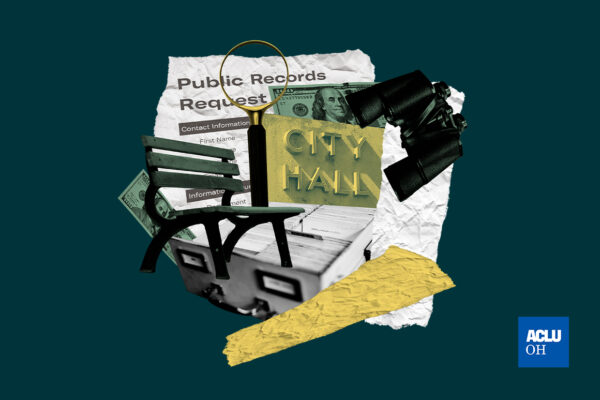This week is Sunshine Week here in Ohio and across the country, a time to raise awareness of laws that keep government meetings and records open and accessible to the public.
Don’t know how to request public records? Don’t know what a public record or a public records request is? You’re in the right place!
Our activist’s guide on public records and open meeting laws is your one-stop shop for all the information you’re looking for to shine that light of yours. Here are some of the highlights:
- What is (and is not) a public record?
- Public records must meet all of the following criteria: they have information stored on a fixed medium (paper, computer, etc.); they are created, received, or sent under the jurisdiction of a public office; and they document the organization, functions, procedures, policies, operations, decisions, or other activities of the office. Think emails, meeting minutes, correspondence like constituent mail, and so on.
- There are exceptions, though! Medical records, active law enforcement investigations, and attorneys’ private notes are a few examples. You can find the full list of exceptions in section 149.43(A)(1) of the Ohio Revised Code.
- From whom can I request records?
- Any state or local public office! For those of you who love double-checking the Ohio Revised Code, section 149.011(A) contains the definition of public office.
- Who can request public records?
- Anyone! Our public records and open meetings laws do not have restrictions on who can request records, as it should be.
- How can I file a public records request?
- Our guide has you covered with a step-by-step walkthrough. Two important things to keep in mind, though: think about exactly what type of records you need, and make sure you give the office a definitive timeline.
- What about court records?
- To request court records, you need to follow a different process set forth in the Rules of Superintendence. Our guide has more information about that process, too.
- What can I do if my request is denied?
- Your options depend on the type of records you’re requesting, but generally speaking, your next step would involve court action.
- It’s important to remember that the law only requires public offices to provide the request in a “reasonable period of time,” which is pretty vague. So, response times can vary. Maybe your State Representative gets back to you within a week, while your County Prosecutor takes a month. Don’t be afraid to follow up with a phone call! The office might just need a little clarification on what you’re asking, and perhaps a nudge to get the job done.
Each year, we are reminded of the importance of open and transparent government. This year, that reminder comes in the form of continuing fallout over the largest bribery scandal in state history, which has already seen a former Speaker of the Ohio House sentenced to 20 years in prison.
We at the ACLU of Ohio are also watching legislation that would allow the governor, the house speaker, and the senate president to retain their own attorneys in legal matters. This change potentially could result in some of their office records being shielded from the public.
As Peter Parker’s Uncle Ben would say, with great power, there must also come great responsibility. That is true for elected officials, and one could add that with their power must also come transparency and accountability.
This Sunshine Week, welcome another season of Spring government transparency by letting in that natural light and keeping extra batteries handy for your flashlight! Together, we can use these tools to hold every level of our government accountable.


